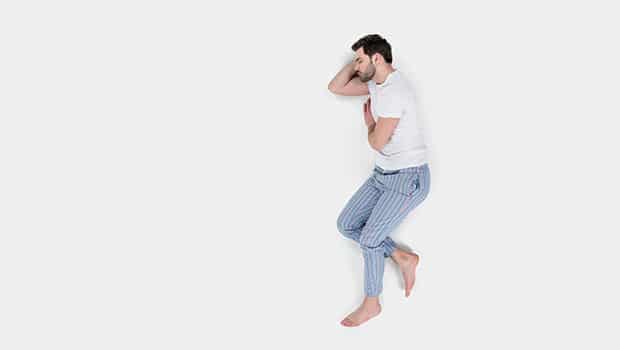The neuroscientist and science writer Matthew Walker describes lack of sleep as a ‘slow form of self-euthanasia’. His best-selling book Why We Sleep is a wake-up call for all of us, writes Jim Manson
Everyone in the book world seems to agree that Matthew Walker’s No 1 best-seller Why We Sleep was the surprise publishing phenomenon of 2017.
But perhaps the real surprise was that anyone was surprised in the first place. You can barely open a newspaper or switch on the TV before being warned again about how chronically sleep-deprived we are, how our ‘always-on’ lifestyles are robbing us of our few remaining moments of restfulness and reflection, or how blue light pollution is messing with our circadian rhythms.
We are jittery, distracted, officially knackered. We already knew that. But what many of us didn’t know was just how serious the repercussions were. And that’s why Walker’s book is a such wake-up call.
Walker – professor of neuroscience and psychology at the University of California and founder of the Centre for Human Sleep Science – has immersed himself for over two decades in the new science of sleep. What he and his team have found is that sleep is ‘more complex, profoundly more interesting and alarmingly more health relevant’ than we could have ever imagined.
In Why We Sleep, Walker doesn’t make you wait long to find out just how ‘alarmingly health relevant’ sleep is. The full, terrifying charge sheet comes on page one. Inadequate sleep (routinely getting less than six or seven hours a night) ‘demolishes your immune system, more than doubling your risk of cancer’; ‘is a lifestyle factor determining whether you will develop Alzheimer’s disease; ‘disrupts blood sugar levels so profoundly that you would be classified as pre-diabetic’; and ‘increases the likelihood of your coronary arteries becoming blocked, setting you on a path to cardiovascular disease, stroke and congestive heart disease’.
And if that doesn’t make you want to go and lie down, Walker adds that so-called ‘short sleeping’ also contributes to ‘all major psychiatric conditions including depression, anxiety and suicide’. Little wonder then, that he describes lack of sleep as a ‘slow form of self-euthanasia’.
Sleep: a health gateway
But Walker wants us to turn this thinking on its head and look upon good sleep (and getting the right quantities of it) as a gateway to optimum health and wellbeing. To do that, he says, we need to think of sleep as the ‘third
pillar of the health trinity’, alongside diet and exercise.
Before exploring why, and how, good sleep is crucial to our health and wellbeing, Walker winds the clock back a full 500 million years. He wants to know who sleeps, and what came first: the state of wakefulness, or sleep.
The answer to ‘who sleeps?’ is simple. All of us. Without exception, all species of animal studied to date sleep – or experience something very like it. The latest science suggests that it was sleep that enabled the first complex life forms to emerge on Earth. That’s right, sleep enabled wakefulness.
Many of us tend to think of sleep as something we need to do to fix and repair the stresses and strains of the long hours we spend awake each day, but Walker wants us to think about sleep as an enabler, rather than a fixer.
Your rhythm’s not my rhythm
In the centre of our brain is something called the suprachiasmatic nucleus, the internal 24-hour clock that controls our circadian rhythms. Although our circadian rhythms are ‘built-in’ they are affected by lots of local environmental cues: light, temperature and chemical changes in the body. Additionally, each of us has a particular chronotype, our own circadian ‘personality’. These fall into three groups: the morning lark (40%); the night owl (30%); and a third group that falls between the two, but with a slight leaning towards night owl personality (making up another 30%).
The problem for night owls is that pretty much everything about the way the modern world is structured and organized is stacked against them. Take the distinctly unlevel playing field of society’s work scheduling. For Walker, this is a largely unrecognized form of punishment for the night owls, with far-reaching consequences. Not only are the owls among us forced to work when they are functioning at sub-optimal levels, but by often having to burn the candle at both ends they are being set up for higher levels of depression, anxiety, diabetes, cancer, heart attack and stroke.
The evolutionary explanation for our differing chronotypes is that our distant ancestors would have benefited from one group always being awake when a predator turned up at the cave door.
Brain and body reset
For Walker, sleep is the single most effective thing we can do to ‘reset our brain and body health each day’. As well as mitigating the chances of developing any one of an entire parade of chronic illnesses, getting a good night’s sleep is a proven memory aid – both before and after learning. It also helps enhance our ability to forget ‘parasitic memories’ (good for our mental health), while REM dream-sleep acts as an overnight balm for tired minds. Sleep also functions as an effective creative incubator.
Unfortunately, an awful lot of us aren’t getting many of these benefits. In fact, an estimated two-thirds of adults throughout all developed nations fail to obtain the recommended eight hours of nightly sleep.
So, what’s stopping us from sleeping? In a word, modernity. The very way that modern societies and economies are organized, together with some of the scientific advances that we most associate with human progress, have sabotaged our instinctual sleep patterns.
Let there be dark
A lot of our problems with sleeplessness stem from a single scientific breakthrough: the invention of electric light bulb in 1879 by Thomas Edison. This one invention put an end to the natural order of so many things that governed our sleep patterns for millennia; most importantly, rising with the sun and going to sleep as darkness set in. Now we had command over dark and light. The effects were immediate. Longer working hours immediately became possible. Lighting in the home extended ‘daytime’ by hours at the both ends of the day.
The arrival of darkness signals to the suprachias-matic nucleus that night time is in session, resulting in the release of vast quantities of melatonin and launching the evening ‘runway’ to sleep. When homes were flooded
with artificial light this biological process was halted. Our internal clocks were effectively wound back two to three hours each evening.
Fast forward to 1997 and something happens that makes the situation a whole lot worse: the invention of blue light-emitting diodes – LEDs. The light receptors in the eye that communicate ‘daytime’ to the brain are most sensitive to the short wavelength within the blue spectrum, exactly where LEDs are most powerful. It means that LEDs, and all the devices that are lit by them, have twice the harmful melatonin suppression effect as old incandescent bulbs. So, using an iPad in the hours before bedtime delays the natural rise of melatonin by a whopping three hours. But it doesn’t just delay sleep, it affects the quality of sleep, with particularly harmful effects on young, developing brains.
Another way that we have unwittingly sabotaged our natural sleep patterns is by inventing central heating. The constant, regulated temperatures that it gives us have played havoc with our ‘thermic harmony’. “We have effectively severed our relationship with the natural rise and fall of ambient temperatures,” says Walker.
Prescribing sleep
Standing in the way of progress is our collective attitude to sleep. The expectation that we can battle through on a few hours’ sleep a night is so thoroughly ingrained in our modern, connected, always-on lives.
Walker is so convinced about the connection between good quality sleep and good health that he talks about prescribing sleep. But unless we can end society’s apathy to sleep, he says, we will never properly understand its rich diversity of functions. First, we must ‘reclaim our right to a full night’s sleep, without the stigma of laziness’.
Sleep product listings
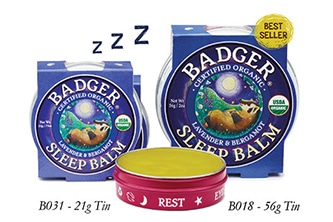 Badger Sleep Balm
Badger Sleep Balm
Grafton International
Tel: 01827 253 328
E-mail: [email protected]
www.graftonsbeauty.co.uk/shop-brands/badger
Our Sleep Balm is a natural sleep enhancer that uses a sophisticated blend of essential oils to help quiet your thoughts and clear your mind, so you can fall asleep naturally. Available in two sizes, Badger Sleep Balm uses pure botanical essences to calm, relax and uplift a restless mind. Applied lightly to temples, pulse points, lips and nose, this gentle balm calms and relaxes. Badger Balm was created by Bill Whyte, a carpenter from New Hampshire, USA and is exclusively distributed by Grafton International for the UK. Badger Balm create a collection of organic products that are always 100% natural.
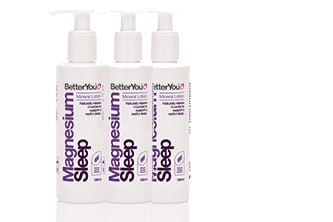 BetterYou Magnesium Sleep Lotion
BetterYou Magnesium Sleep Lotion
BetterYou
Tel: 01226 814 030
E-mail: [email protected]
www.betteryou.com
BetterYou’s brand new Magnesium Sleep Lotion offers a natural solution to our growing sleep problems. Delivering an expertly blended combination of Magnesium Chloride, to help relax tired muscles and lavender and chamomile, to slow sensory activity and quieten the mind. Together they promote a restful night’s sleep. An essential part of any bedtime routine, Magnesium Sleep Lotion is clinically proven to improve sleep quality, allowing for a deeper, more sustained sleep cycle. The dermatologically tested formula is free from parabens, synthetic fragrance and colour.
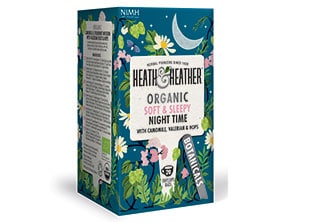 Organic Night Time
Organic Night Time
Heath & Heather
Tel: 0207 349 2516
E-mail: [email protected]
www.heathandheather.co.uk
Heath & Heather are proud to use only the finest natural and organic ingredients known for their therapeutic and rejuvenating properties. This smooth camomile and spearmint infusion is enhanced by valerian root and hops. Valerian has been used as a medicinal herb to promote sleep since the time of ancient Greece and Rome. Naturally caffeine free, with a soft, silky flavour drink 30 minutes to an hour before bedtime for a perfectly tranquil night time routine. RRP £2.99
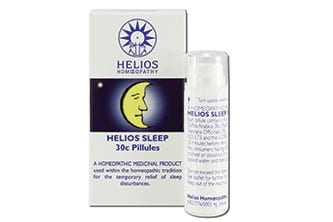 Helios Sleep
Helios Sleep
Helios Homeopathy Ltd
Tel: 01892 537254
E-mail: [email protected]
www.helios.co.uk
We are delighted with the success of our homeopathic combination remedies and the wonderful positive feedback from customers. In the fast paced, pressurised world that we live in, difficulty sleeping is one of the most common complaints seen over the counter. Helios Sleep brings safe, gentle and natural relief for sleep disturbances and is without any known side affects. Attractively packaged for on shelf appeal, Helios Sleep comes in sucrose pill form in our easy to use single dose dispenser. For details of the full range please contact us.
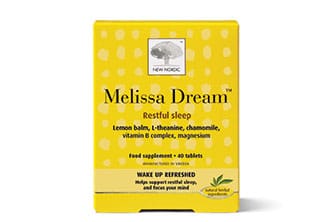 Melissa Dream
Melissa Dream
New Nordic Ltd
Tel: 0800 389 1255
E-mail: [email protected]
www.newnordic.co.uk
New Nordic has developed an all-natural aid to your sleep problems. Melissa Dream™ is based on the newest studies of how plant extracts can be used to calm your mind and body. Melissa Dream ™ contain s a lemon balm extract, L –theanine, chamomile extract, vitamin B complex and magnesium. Lemon Balm is well known for it’s calming effects allowing the body to relax before going to bed and wake up refreshed after a good nights sleep.
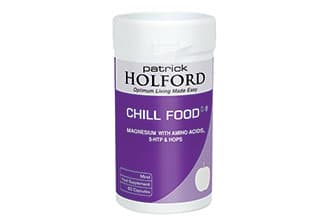 Chill Food
Chill Food
HOLFORDirect
Tel: 0370 3341575
E-mail: [email protected]
www.holfordirect.com
Chill Food, developed by Patrick Holford, supports the calming of the nervous system. It is a unique blend designed for individuals trying to keep up with the pressures of a modern lifestyle. Magnesium contributes to the normal function of the nervous system, psychological function and a reduction of tiredness and fatigue; Hops extract may aid calming of the nervous system and help with sleep; Glutamine is a major amino acid, precursor for GABA the main inhibitory, calming neurotransmitter; and 5-HTP may help improve brain activity. Patrick Holford has written a range of books about nutrition for the mind.
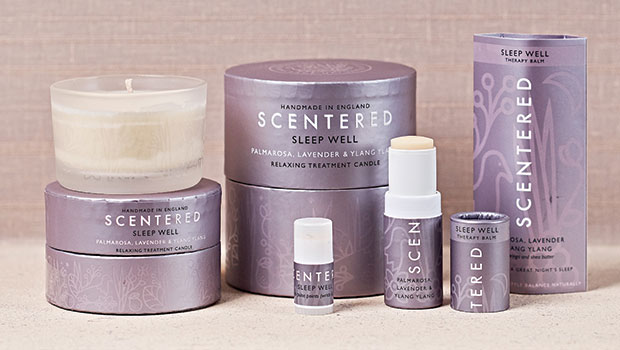 Scentered Sleep Well – therapy balms and candles
Scentered Sleep Well – therapy balms and candles
Scentered
Tel: 0203 4881 461
E-mail: [email protected]
www.scentered.me
Scentered’s Sleep Well Therapy Balm is a 100% natural blend of relaxing Palmarosa, calming Lavender and soothing Ylang Ylang. Apply to wrist pulse points before sleep, inhale deeply and reset your mood. Repeat this ritual nightly to support a long term healthy sleeping habit. Sleep Well therapeutic candles are a sophisticated floral lavender blend that fills the room with a gloriously natural fragrance and harnesses the relaxing and soothing therapeutic benefits of Lavender, Chamomile, Palmarosa and Ho Wood, balanced with Geranium and Ylang Ylang. Balms 5g £14.50, candles £16.50 to £32.00. Scentered is currently welcoming international distributors


